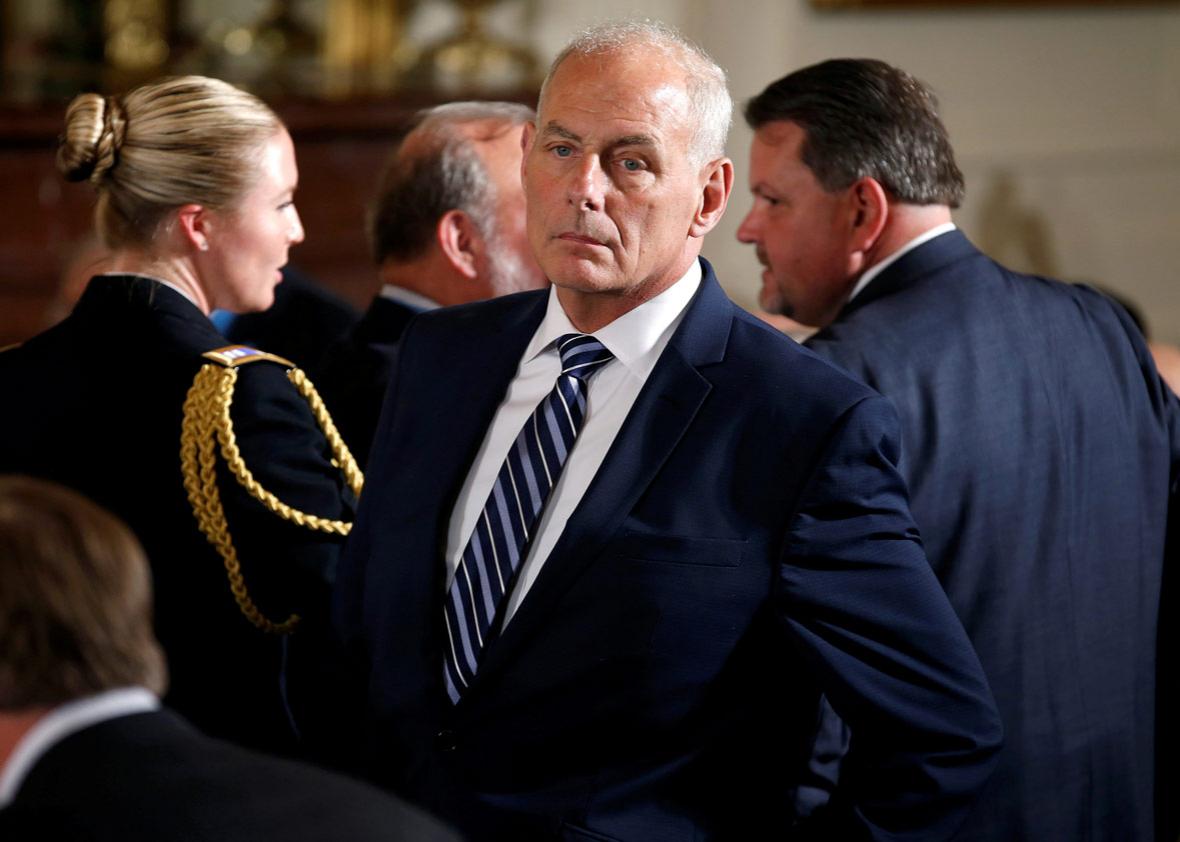President Trump’s new chief of staff, Gen. John Kelly, presents himself as a man alert to danger. “So many things keep me up at night that I don’t get to bed anymore,” he told a national security forum on June 22. In speeches and interviews, Kelly, who served for six months as President Trump’s secretary of homeland security, warns the public to be on guard. If you see “people acting strangely,” he says, “report to your local law enforcement … Every citizen is in my view, an intelligence collector.”
Some kinds of people particularly arouse Kelly’s suspicions. One such group is refugees. “We have, I think, exercised entirely too much good faith” in accepting their statements about who they are, he told senators at a June 6 hearing. Kelly also doubts the innocence of anyone detained by U.S. Immigration and Customs Enforcement. “Seventy-five percent are indeed criminals,” he told Fox and Friends on May 26. “The other 25 percent are not the valedictorians of their high school class.”
But Kelly’s vigilance is selective. For instance, while declaring that anyone detained by ICE agents deserved to be, Kelly holds the officers themselves above suspicion. In an NBC interview on April 15, Kelly noted that drug cartels had plenty of money to corrupt law enforcement officials in Mexico or Guatemala. Yet he defended proposals to scale back polygraph testing of U.S. Customs and Border Protection agents. “The men and women of ICE, CBP, Secret Service” are “very, very high-quality people,” he explained. “The current polygraph system … [is] very arduous, and it’s not very pleasant.” And when people in the Trump administration are accused of wrongdoing, Kelly asserts their innocence and dismisses calls for further scrutiny. Anyone who thinks Kelly will bring accountability to the White House is mistaken. His record says he won’t.
On May 26, the Washington Post reported that in a meeting two months before taking office, Trump’s son-in-law and senior adviser Jared Kushner had asked Russia’s ambassador about possibly “setting up a secret and secure communications channel between Trump’s transition team and the Kremlin, using Russian diplomatic facilities in an apparent move to shield their pre-inauguration discussions from monitoring.” This was the latest of several conversations with Russians that Trump’s aides had failed to disclose, some of which involved the possible relaxation of sanctions. Kushner, under pressure from Congress to come clean, would later issue a statement that didn’t deny the meeting or the proposal.
No intelligence official could remember anything like Kushner’s idea—clandestine communications using the equipment of the country that had just interfered in our election—being proposed for honorable purposes. But Kelly said it was fine. “Any way that you can communicate with people, particularly organizations that are maybe not particularly friendly to us, is a good thing,” Kelly argued. He said of Kushner: “I know Jared. He’s a great guy, decent guy. His No. 1 interest, really, is the nation.” At the June 6 hearing, Kelly brushed aside senators’ questions about the meeting, declaring: “We have to make the assumption—and I will—that Jared Kushner is a great American.”
The general was even more zealous in his defense of Trump. On March 6, CNN’s Wolf Blitzer asked Kelly about Trump’s allegation, made two days earlier, that President Obama had wiretapped him at Trump Tower. Kelly answered with blind faith:
Kelly: If the president of the United States said that, he’s got his reasons to say it. He’s got some convincing evidence that that took place.
Blitzer: What possibly could that convincing evidence be?
Kelly: I don’t pretend to even guess as to what the motivation may have been for the previous administration to do something like that.
Blitzer: You work closely with the FBI director, James Comey. … He’s incredulous how President Trump could make this accusation … If Comey went public and said this never happened, as [James] Clapper did, the former director of national intelligence, would you believe Comey? …
Kelly: James Comey is an honorable guy. So is the president of the United States. And the president must have his reasons.
Denials from Comey and Clapper, combined with a complete absence of evidence, couldn’t shake Kelly’s faith in the president. Nor could firsthand experience. Kelly was in the Oval Office on Feb. 14 when Trump asked everyone but Comey to leave. Three months later, Trump fired Comey, and the New York Times disclosed that in a memo, Comey had documented Trump’s use of that one-on-one conversation to press for curtailment of the Russia investigation. Trump said Comey’s account of the episode was fiction, and on July 19, he specifically denied that he had cleared the room. Kelly must know that this denial is false. Yet he has never said a word.
Despite this experience, Kelly continues to defend Trump’s veracity. Several days after Comey was fired, the Post and Times reported that in a subsequent Oval Office meeting with Russian Foreign Minister Sergey Lavrov, Trump had disclosed Israeli intelligence. They substantiated their reporting with descriptions of specific conversations. The White House couldn’t refute the reporting, so it vaguely asserted that the story was false. Two weeks later, Kelly stood by Trump’s denial. “I’ll take him at his word,” said the general. “I should take the president at his word.”
In an administration staffed by liars, bullies, sycophants, and cowards, Kelly might be the best we can hope for. He’s disciplined and willing to fire a hothead like Anthony Scaramucci, whose personal agenda threatened to torch the White House. But don’t expect Kelly to hold Trump, Kushner, or any other senior officials to account, particularly for their covert dealings with Russia. Kelly isn’t a watchdog. He’s a lapdog.
